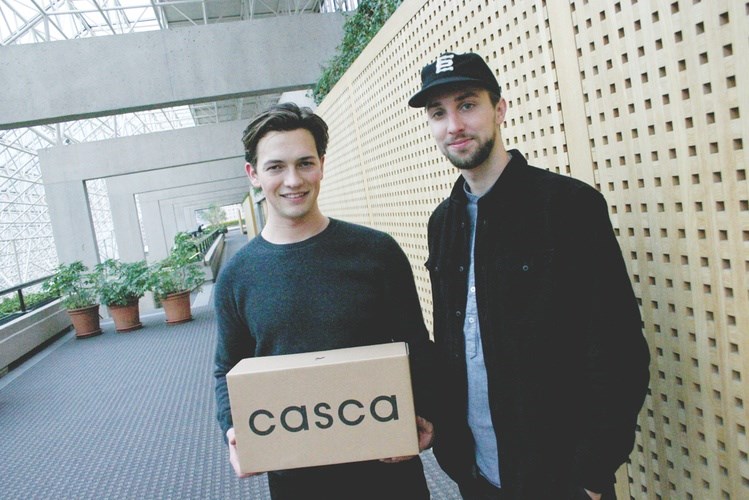For most B.C. startups, China may seem like a daunting, faraway market that can be reached only when companies have attained a certain size and scale.
But for Vancouver-based lifestyle upstart Casca Footwear, the world’s second-largest economy has been as much an enabler as it has been a goal.
China’s manufacturing sector, as it matures and becomes higher-end, is providing technology, materials and talent, which has allowed the fledgling B.C. company to go from a nebulous idea in the minds of its two founders earlier this year to making its first round of shipment orders in a few months’ time – all on an investment capital base of only around $150,000.
“I think there’s still a stigma when it comes to manufacturing in China, and we are one of the companies trying really hard to change that,” said Casca operations director Braden Parker, who founded Casca with creative director Kevin Reid, the former lead footwear designer for major Vancouver brand Native Shoes.
“We are loud and proud of our shoes being made in China,” Parker said. “We are not shying away from it at all. If anything, we want to teach people that things like the iPhone is made in China, and the quality of manufacturing is just moving higher and higher.”
China, the world’s largest shoe manufacturer, produced 13.1 billion pairs in 2016. But as the country’s cost of living rises as the economy matures and saturates, some global brands have started shifting production to countries like India (2.3 billion pairs), Vietnam (1.2 billion pairs) and Indonesia (1.1 billion pairs).
But for Casca, China’s higher manufacturing costs come with a corresponding gain. As the sector moves upmarket, the available leather, foam padding and other materials – along with the craftsmanship associated with creating new footwear from scratch – mean Casca can take its unconventional ideas to manufacturing partners and have them quickly create concept models, a job typically reserved for studios in design-heavy European markets like Italy.
“I don’t know if there’s anywhere else in the world where you can go for seven days and get nine different prototypes of a shoe,” said Reid, who was connected to Chinese manufacturers through a partner in Taiwan that operates a studio in China’s southern Guangdong province.
“The most advanced materials, the highest-quality leathers … everything is there. All the tools are in the tool box. If we were somewhere like Italy, we’d have half of those tools at our disposal. What they have [in China] is a production process that’s not only rapid, but also high-quality.”
Casca will launch its first round of online pre-orders for its “performance all-day footwear” in February, and the company expects to get 1,000 pairs of shoes for its first factory order in May.
Parker said the firm aims to have 5,000 pairs sold after one year, but added the initial pre-order campaign will be the biggest indicator of success for the new company.
He said Casca is also using the services of Ottawa-based Shopify (TSX:SHOP) to set up its online store.
The ability to skip retailers and sell directly to consumers through online channels is another reason why the company can keep its operations capital – currently raised through Parker and Reid’s family and friends – at an estimated $150,000.
“A lot of people, when they see that figure, would think we’re crazy,” Parker said. “I think that was part of the feedback we got initially when we were developing the whole business plan. Nobody thought it was possible … and we’re excited to show people how we can do it.
“The biggest risk will be the pre-orders; the bigger the pre-order, the less stressed we will be, and that $150,000 figure can potentially shift downwards if we get enough sales.”
Startups like Casca face a hypercompetitive environment, according to industry analysts.
An October IBISWorld report put annual revenue for the overall Canadian footwear market at $4 billion. It estimated that the sector’s annual growth rate has been 6.3% during the last five years.
Euromonitor International, meanwhile, said in a February report that footwear giant Aldo leads the Canadian market, and many traditional retailers are increasingly boosting investment in digital and online sales to counter the advent of online sellers that pose an increased threat to bricks-and-mortar operations.
But for Reid, Casca will be banking on its innovation – the designer is promising a number of design details, one of which is a heel stabilizer that’s patent-pending – and going after influencers in North American West Coast tech industries to spur consumer interest.
Casca’s initial efforts will be focused on three cities – Vancouver, Seattle and Los Angeles.
“The thing with sneakers is that there’s a massive online community for this type of product,” Reid said.
“There are major industry and enthusiast blogs, and we are well connected with those people. So we should be able to get word out pretty quickly, to get exposure that way.”



